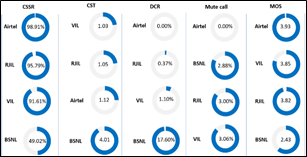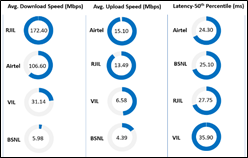Travelers and commuters in Andhra Pradesh now have clear insights into mobile network reliability along two major corridors. The latest independent evaluation by the Telecom Regulatory Authority of India examines signal strength, call clarity, and internet speeds on the busy Hyderabad to Visakhapatnam railway line and the Visakhapatnam to Vijayawada national highway. Conducted over early September 2025, this study offers a realistic picture of how networks perform in cities, towns, and remote stretches alike.
Field Tests Cover Over 1,000 Kilometers
Teams from the regulator’s Hyderabad office drove more than 695 kilometers along the rail route and another 363 kilometers on the highway between September 3 and 4. Every major operator faced the same scrutiny using standard tools and handsets that switch automatically between 5G, 4G, 3G, and 2G. The goal was simple: measure what users actually experience, not just lab results.
The rail journey passed through key stations like Pagidipalli, Warangal, Khammam, Vijayawada, Eluru, Rajahmundry, and Samalkot. On the road, testers noted performance near Kasimkota, Nakkapalli, Rajanagaram, Hanuman Junction, and Gannavaram. These spots include dense urban pockets, quiet villages, and open countryside, giving a balanced view of coverage.

Voice Calls: Reliability Varies Widely
When it comes to making a call, success rates tell the story. Airtel achieved the highest connection rate at nearly 99 percent, followed by Reliance Jio at 96 percent. Vodafone Idea managed 92 percent, while BSNL struggled with only 49 percent of calls connecting on the first try in automatic mode.
Dropped calls were rare for most providers. Airtel recorded zero interruptions, Jio less than half a percent, and Vodafone Idea just over one percent. BSNL, however, saw calls cut off in 17.6 percent of attempts, pointing to serious gaps in stable coverage.
Call setup time stayed under two seconds for private operators. Jio clocked the fastest at 1.05 seconds, with Airtel and Vodafone Idea close behind. BSNL needed four seconds on average, which can feel frustrating during urgent conversations.
Speech quality received scores out of five. Airtel topped the list with 3.93, meaning clear and natural sound. Jio and Vodafone Idea both scored above 3.8, while BSNL lagged at 2.43, indicating muffled or distorted audio in many areas.
Silent patches during calls affected packet-switched networks. Airtel again showed zero mute moments, but the others hovered around three percent, enough to annoy users mid-sentence.
Voice Performance Snapshot
| Operator | Call Connect Rate | Drop Rate | Setup Time (sec) | Sound Score |
|---|---|---|---|---|
| Airtel | 98.91% | 0.00% | 1.12 | 3.93 |
| BSNL | 49.02% | 17.60% | 4.01 | 2.43 |
| RJIO | 95.79% | 0.37% | 1.05 | 3.82 |
| VIL | 91.61% | 1.10% | 1.03 | 3.85 |
Data Speeds: Jio Dominates Downloads
Internet performance showed stark differences. Reliance Jio delivered average download speeds of 172 Mbps across its 5G and 4G layers, making video calls and large file transfers smooth even in motion. Airtel followed with 107 Mbps, strong enough for most daily needs.
Vodafone Idea averaged 31 Mbps, suitable for browsing and streaming in standard definition. BSNL trailed at 6 Mbps, limiting users to basic tasks and causing frequent buffering.
Upload speeds painted a similar picture. Airtel hit 15 Mbps, Jio 13.5 Mbps, and Vodafone Idea 6.6 Mbps. BSNL managed 4.4 Mbps, adequate for messages but slow for sharing photos or documents.
Network responsiveness, measured by latency, stayed low for all private players. Airtel recorded 24 milliseconds at the median, Jio 28 ms, and Vodafone Idea 36 ms. BSNL came in at 25 ms, surprisingly competitive despite slower speeds.

What the Numbers Mean for Commuters
Rail passengers heading from Hyderabad to Visakhapatnam can expect rock-solid voice service on Airtel and decent data on Jio. Highway drivers between Visakhapatnam and Vijayawada face similar choices: Jio for fast internet, Airtel for uninterrupted calls.
BSNL users may want to carry a secondary SIM for critical trips. Areas around Warangal, Khammam, and Eluru showed consistent private network strength, while remote patches near Motumari and Timmapuram occasionally dipped for all carriers.
Video streaming tests confirmed Jio’s edge, with minimal delays even at 1080p resolution. Airtel handled high-definition playback well, but Vodafone Idea and BSNL often required lowering quality to avoid pauses.
Room for Improvement Across the Board
While private operators scored high marks, no network achieved perfection. Jio’s slight edge in drop rates and Vodafone Idea’s moderate latency suggest ongoing investments are needed. BSNL clearly requires urgent upgrades to match competitors in both voice and data.
Regulators shared detailed findings with each company, expecting targeted fixes in weak zones. Travelers can check the full dataset on the official telecom watchdog portal for station-by-station breakdowns.
This kind of transparent testing helps consumers pick the right plan and pushes operators to raise standards. As 5G rolls out further along these routes, future reports should show even better results.
Staying connected matters whether you are catching a train at dawn or driving late at night. The latest TRAI network quality report arms Andhra Pradesh residents with facts to make informed choices.
Focused keyword: TRAI Network Quality Report
Meta description: TRAI Network Quality Report reveals mobile performance on Hyderabad-Visakhapatnam rail and Visakhapatnam-Vijayawada highway. RJIL leads in speed, Airtel in voice reliability.
